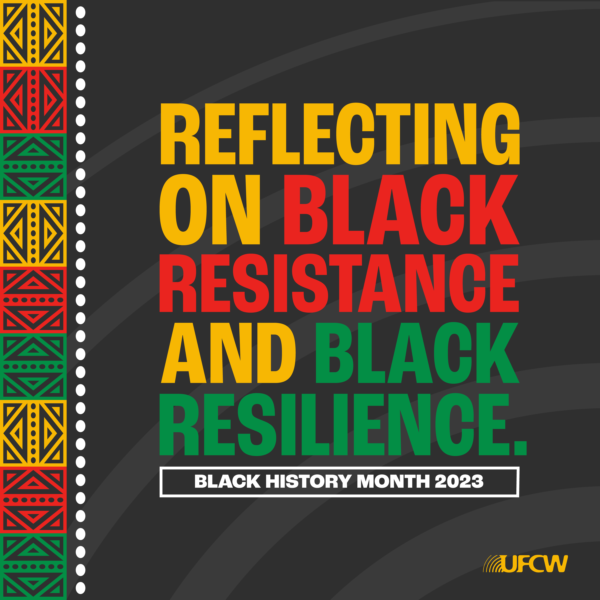
This Black History Month, the UFCW celebrates the achievements of Black leaders in the civil rights and labor movements that have benefitted working Americans to this day. The two movements have historically been closely linked as they fought together for racial and economic justice.
This year’s theme, “Black Resistance,” spotlights the perseverance of Black people in their struggle against systemic racism in America. It is particularly poignant at a time where Black people are fighting against renewed efforts to erase their history and culture from our educational curriculums.
Below, we want to share some key achievements in Black labor history that had a lasting impact on Black Americans and this country. Although not all victories were permanent, they demonstrate the resilience and steadfastness to renew their fight for freedom and equality, win or lose.
Founding of the Congress of Industrial Organizations (CIO)
The Congress of Industrial Organizations (CIO) was founded in 1935 by John L. Lewis (People’s World) with the goal to unionize industrial workers, including unskilled and Black workers. At the time, only a small percentage of Black workers in the transportation, extraction of minerals, or manufacturing industries were members of a trade union. The CIO was made up of eight international unions belonging to the American Federation of Labor (AFL), but quickly became its rival when the AFL expelled its member unions.
The CIO quickly grew its membership by sweeping victories in the auto and steel industries. Other industries followed and CIO membership rapidly grew over the coming years. W.E.B. Du Bois (In These Times) called CIO’s efforts to overcome the racial divide between its members as “probably the greatest and most effective effort toward interracial understanding among the working masses.” In 1955, the CIO ended up merging with the AFL, bringing with it hundreds of thousands of Black members into the newly integrated union.
Founding of the Brotherhood of Sleeping Car Porters
The Brotherhood of Sleeping Car Porters (BSCP) was founded in 1925 by A. Philip Randolph (Brittanica) and was the first successful black trade union. The goal of the BSCP was to organize Black railroad porters and maids who worked for the Pullman Company, a train manufacturer and operator. It took 12 years for the union to gain recognition with the Pullman Palace Car Company, but the fight inspired a generation of African American labor leaders.
Randolph was also able to use his position as the head of BSCP to influence wider labor policy. In 1941, he threatened to march on Washington, D.C. to protest racial discrimination in the defense industry. As a result, President Roosevelt issued an executive order prohibiting discrimination in the defense industry and established the Fair Employment Practices Commission to enforce the order. Randolph went on to serve as the vice president for the newly merged AFL-CIO and influenced its widespread support for the civil rights movement.
The Memphis Sanitation Workers Strike
On February 1, 1968, two Memphis garbage collectors were crushed to death by a malfunctioning truck. Before the tragedy, the overwhelmingly African American employees of the Memphis Department of Public Works repeatedly raised concerns about the deteriorating safety standards and being forced to work long hours with overtime pay. The death of the two garbage collectors was the final straw and on February 12, Memphis sanitation workers voted to go on strike.
T.O. Jones, a former garbage collector who had been trying to organize the sanitation workers for the last decade, led the spontaneous strike while AFSCME stepped in to provide financial support to the men. The strike, which was supported by civil rights leaders (History.com), lasted until April 16, when the workers won recognition of their union and a commitment to higher wages.
The Texas “Sick Chicken” Strike
In 1953, Clara Holder, a worker at the Eastex Poultry plant in Center, Texas, wrote to the Amalgamated Meat Cutters (which later became the UFCW) asking for their support in organizing a union at her plant. The majority of workers at the plant were Black women, who worked in unsanitary conditions, had mandatory overtime without pay, and suffered chronic health problems due to the grueling environment. When plant management refused to negotiate in good faith, the Meat Cutters launched a national boycott of their products and the workers walked out of the plant in the spring of 1954. Union officials were also appalled by the sight of diseased chickens that were being processed at the plant. They organized a broad coalition of unions, public health officials, and labor press to push Congressional hearings on poultry conditions. The multipronged pressure campaign worked and the company came back to the negotiating table after an 11 month strike, agreeing to wage increases, paid holidays, and better job security. The major victory had a ripple effect on the safety conditions of the entire U.S. poultry industry and led to the Poultry Products Inspection Act of 1957 (East Texas Historical Journal).



